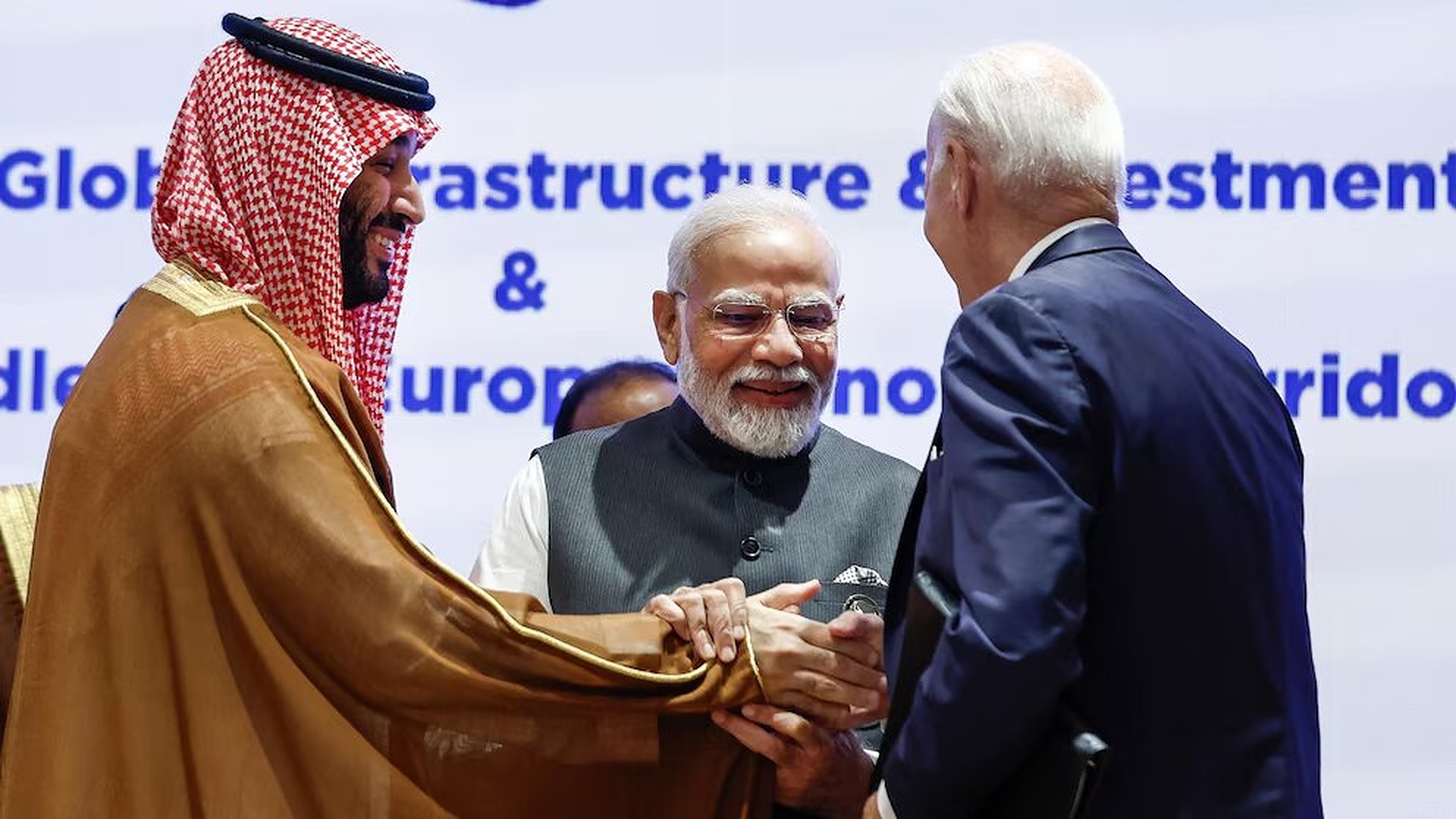At the G20 conference — the premier forum for international economic cooperation — U.S. President Joe Biden declared that Israel, France, Germany, Italy, the United States, Saudi Arabia, and the United Arab Emirates (UAE) will establish the “India-Middle East-Europe Corridor” (IMEC): a multimode transit corridor spanning over 3,000 miles.
Israel, which has prioritized improving ties with the Gulf countries over the past three years, praised the initiative, claiming that it “changes our global and historical situation” and advances the goal of “joining Israel to the world.”
In fact, the initiative was welcomed by Prime Minister Benjamin Netanyahu as “the greatest cooperation project in [Israel’s] history.”
In his description of the ambitious system, Netanyahu described Israel as its essential hub: “Our country Israel will be a central junction in this economic corridor, our railways and our ports will open a new gateway from India through the Middle East to Europe, and back.”
Tzachi Hanegbi, Netanyahu’s national security adviser, referred to the proposal as “the most meaningful evidence” that normalization between Saudi Arabia and Israel was moving from being “a shot in the dark” to a viable option with attainable objectives.
Since the initiative was announced, questions regarding the impact it can realistically have on normalization with Israel, and whether or not it can overshadow other projects such as China’s Belt Road initiative and the Suez Canal, have been put on the table.
Egyptian Streets provides an overview of analysts’ conclusions below:
What is the India-Middle East-Europe Corridor?
The new IMEC first came into life following a Memorandum of Understanding (MoU) signed by the leaders of the United States, India, Saudi Arabia, the United Arab Emirates, France, Germany, Italy, and the European Union, pledging cooperation to create a new India-Middle East-Europe Economic Corridor.
The IMEC will be made up of two distinct corridors: one connecting India to the Arabian Gulf in the east and one linking the Arabian Gulf to Europe in the north. A railway will also be included once finished, which will offer a cross-border ship-to-rail transit network to supplement current maritime and road transport routes, allowing goods and services to transit to, from, and between India, the UAE, Saudi Arabia, Jordan, Israel, and Europe.
The corridor aims to usher in a new era of connectivity by linking these countries to commercial hubs, making it easier to develop and export clean energy, lay undersea cables to connect energy grids and telecommunication lines, increase the number of people who have reliable access to electricity, and link communities to a safe and reliable Internet.
Along the corridor, it is also expected that there will be an expansion of trade and production while enhancing supply chains and food security. The main strategy, according to the MoU, aims to encourage the creation of high-quality jobs by attracting fresh investments from partners, particularly the private sector.
The full MoU can be read here.
What is different about this new trade route?

For India, the main purpose of the IMEC is finding alternative trading routes and avoiding encirclement by China’s Belt Road Initiative.
Five of India’s neighbors are included in the Belt and Road Initiative: Pakistan, Bangladesh, Sri Lanka, the Maldives, and Nepal. Analysts say that India fears that the plan will give Beijing undue political influence in neighboring capitals and that new ports and roadways could one day help China in a military battle.
“This new connectivity constitutes a strategic paradigm shift of enormous geopolitical consequence that could reshape [India’s] role in the Eurasian economic order,” says Michael Tanchum of the University of Navarra in Spain, who researches strategic connectivity networks between Asia, Europe and Africa.
For the U.S., the IMEC constitutes a chance to counter Saudi Arabia’s growing links to China and to normalize relations between the Kingdom and Israel in exchange for a security agreement and U.S. backing for Saudi Arabia’s efforts to create its own civilian nuclear programme.
Last month, Biden referred to China’s BRI as a “debt and noose agreement,” which the US and the G7 countries intend to resist with alternatives.
However, according to Cinzia Bianco, a visiting fellow at the European Council on Foreign Relations think tank in Berlin, the region’s trade volume is probably insufficient to support both Biden’s effort and China’s initiative concurrently.
However, experts suggest that the India-Middle East-Europe corridor isn’t necessarily an alternative for the BRI for the UAE and Saudi Arabia. The corridor is “a manifestation of the global connectivity agenda the UAE and the region (are) perusing,” Mohammed Baharoon, general manager of the Dubai Public Policy Research Centre, told CNN.
“It will complement, more than compete with China’s BRI since both of them are attempts to facilitate the movement of goods (including energy), money, people, and data,” he said.
As explained by Carla Slim, an economist at Standard Chartered Bank, “increased efforts to further develop economic corridors and comprehensive trade agreements all feed into the UAE’s target to almost double its non-oil foreign trade to Dh4 trillion by 2031, from Dh2.2 trillion in 2022, and to double overall GDP [gross domestic product] to Dh3 trillion by 2030.”
Efraim Inbar, president of the Jerusalem Institute for Strategy and Security, said: “It’s part of President Biden’s efforts to bring the Indians into the U.S. camp.”
This year, an important diplomatic victory for China came when Saudi Arabia and Iran unexpectedly informed Washington that diplomatic relations had been restored in the Chinese capital.
Yoel Guzansky, senior research fellow at the Institute for National Security Studies in Tel Aviv, asserted that “the White House received a wake-up call.” Since then, there have been efforts to revive a variety of projects and programmes centered on normalizing relations with Israel, as well as with Iran and Saudi Arabia.
How will this affect Egypt?
In an interview on Monday, former Chairman of the Suez Canal Authority and the General Authority for Suez Canal Economic Zone Mohab Mamish said that the economic corridor is a very expensive procedure that is not comparable to the Suez Canal.
Mamish explained that the cost and time involved are exhaustive for maritime transportation, as it will cross over land and water multiple times. The Suez Canal, he asserted, is the sole option available for maritime transportation, as it continues to be the fastest route: it takes just 11 hours to travel between the Mediterranean and Red Sea via the canal.
Despite this, analysts are saying that the economic corridor is just the first step to redraw the economic and political map and center Israel’s Haifa port as a key stage in the corridor.
Some commentators say that IMEC essentially stands for a restoration of British colonialism in the Middle East. The Ottoman-built Hejaz railway, which ran from Damascus to Medina with a branch line to Haifa, was taken over by the British Empire after 1917.
An oil pipeline constructed by the British in the 1930s connected Kirkuk, in Iraq, to Haifa, which served as a crucial energy and transportation hub for Britain during the Second World War. Israel constructed the Eilat-Ashkelon pipeline in 1957 to transport Iranian oil to Europe.
While Israel’s existence was initially dependent on its incorporation with the British Empire, followed by the Cold War alliances led by the U.S., it is now shifting towards the developing infrastructure of west Asia.





Comments (2)
[…] At the G20 conference — the premier forum for international economic cooperation — U.S. President Joe Biden declared that Israel, France, Germany, Italy, the United States, Saudi Arabia, and the United Arab Emirates (UAE) will establish the “India-Middle East-Europe Corridor” (IMEC): a multimode transit corridor spanning over 3,000 miles…Read More […]
[…] post Explainer: Will The New India-Europe Corridor Affect Egypt’s Suez Canal? first appeared on Egyptian […]